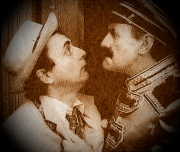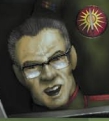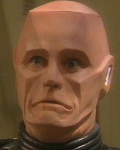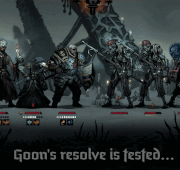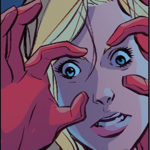|
Android Blues posted:Basically whoever wrote that scene had a tin ear for tone and an inept social conscience. That's my take. The first episode of Torchwood was all Russell T. Davies' own work. Rusty wrote that scene.
|
|
|
|

|
| # ? May 19, 2024 11:24 |
|
The_Doctor posted:The first episode of Torchwood was all Russell T. Davies' own work. Rusty wrote that scene. I stand by my statement and find it consistent with some of his work on Doctor Who.
|
|
|
|
After The War posted:You've... put a lot of thought into this. Unless that's from one of the audios I have yet to get to. The first two are pretty common and the third was just for the rule of threes.  The number of episodes of science fiction or fantasy shows where some writer goes "Maybe rape... has a gray area?" and they paint that grey by taking easily comparable real-world scenarios and replacing a few words with "alien" or "magic" is frankly astounding. The number of episodes of science fiction or fantasy shows where some writer goes "Maybe rape... has a gray area?" and they paint that grey by taking easily comparable real-world scenarios and replacing a few words with "alien" or "magic" is frankly astounding.
|
|
|
|
Bicyclops posted:The weird thing about the serialized nature of television is how often a character will do something that makes them nonredeemable really early on in a series, and it's waved off as being part of the supernatural magic stuff (or "science"). I'm rewatching Buffy and Xander tries to rape her in the sixth loving episode, and yeah, it's because he has been possessed by hyena spirits or whatever, but while he is doing it, he very definitely says a bunch of stuff that is totally in character for him, and they are sentiments he continues to express and are poisoned further by the "hyena" incident. The major difference is, as far as I remember because gently caress watching any of torchwood again to check, that in Torchwood the character isnt under the influence of... well, anything. He has some alien rohypnol and uses on a girl, when her boyfriend objects he uses it on him too and then takes the both home. The fact he did this is never mentioned again, and is not part of the plot of the episode, its just how he is introduced to the viewer (pretty sure thats episode 1, but I could be wrong). So in your Buffy example, its like that except if Xander had been introduced in episode 1 mid rape. And wasnt possessed by Hyena spirits, but instead was just a bit rapey sometimes but it didnt seem to bother the rest of the characters. So in summary, only really a bit like that example. In all seriousness I could be misremembering details, Torchwood was loving awful in every aspect (even Children of Earth is only "good compared to the rest of torchwood", compared to something less objectionable like sitting staring into space for a couple of hours its not great). and a lot of it blurs together. Why I watched as much of it as I did is a goddamn mystery to me.
|
|
|
|
Bicyclops posted:The first two are pretty common and the third was just for the rule of threes. The third one was actually depressingly close to a truly terrible comic book made by the guy who wrote Wanted and Kick-rear end.
|
|
|
|
PantsOptional posted:The third one was actually depressingly close to a truly terrible comic book made by the guy who wrote Wanted and Kick-rear end. Nemesis by Mark Millar?
|
|
|
|
Yeah, although apparently I suppressed a lot of memories of that book and it's just that he's rigged someone's womb to collapse after forcibly artificially impregnating her with her brother's sperm. It's about the same caliber of writing, though.
|
|
|
|
wow the guy that wrote kick-rear end is a weird creep? i'm shocked, SHOCKED
|
|
|
|
I am pretty sure Mark Millar also wrote a comic where a supervillain obtains reality warping powers, and defeats one of his enemies by going backwards in time and molesting them when they were a child. Yeah.
|
|
|
|
On a brighter note, I just listened to the first story of 100, where the 6th Doctor tries to get Julius Caesar's dad laid while Evelyn does her best to cockblock, and it's great
|
|
|
|
Wheat Loaf posted:I am pretty sure Mark Millar also wrote a comic where a supervillain obtains reality warping powers, and defeats one of his enemies by going backwards in time and molesting them when they were a child. Wasn't that in The Authority? A previous Doctor got his powers back and went back in time to the Engineer's childhood during the middle of a fight and became her childhood doctor.
|
|
|
|
Jerusalem posted:On a brighter note, I just listened to the first story of 100, where the 6th Doctor tries to get Julius Caesar's dad laid while Evelyn does her best to cockblock, and it's great All three parts of 100 are really great and summarize the Six/Evelyn era nicely. Good thing they didn't have Joseph Lidster contribute a story, that would have thrown the whole thing off.
|
|
|
|
After The War posted:All three parts of 100 are really great and summarize the Six/Evelyn era nicely. Good thing they didn't have Joseph Lidster contribute a story, that would have thrown the whole thing off. Agreed. Throwing in some "BUT THEN IT TURNED OUT THE DOCTOR HADNT SAVED THEM" story would have soured it.
|
|
|
|
I sure am glad I didn't just listen to just such a story!
|
|
|
|
That's right, I'd forgotten what a roller-coaster ride 100 was. The Julius Caesar thing just gets more and more preposterous, though, and Colin Baker does an extremely good job of Six reacting to the entire thing like someone has just written an absurd story that he's the punchline and is very, very grumpy about it. My Own Private Wolfgang is also fantastic (it's Shearman, after all). 100 Days of the Doctor was fun but it winked just a little too much at celebrating Big Finish. They almost hit you over a hammer with the "How come it is that you only see your Fifth, Sixth and Seventh selves?" stuff. They were allowed, though; it was their 100th story! A little bit of self-congratulatory joking was warranted, and it's just the one story. I'm glad they decided to just stick with three instead of hiring Joe Lidster to write a fourth story.
|
|
|
|
Bicyclops posted:I'm glad they decided to just stick with three instead of hiring Joe Lidster to write a fourth story. "It's ok, Doctor. Show me on the doll where Omega touched you."
|
|
|
|
Cross-replying from the Toxx thread to avoid spoilers there:Angela Christine posted:Like the ghastly painting in the background of The Lodger. Or one episode that had a classic red telephone booth in the background of a shot of london and people were wondering if it might be the master's TARDIS or something, because those booths aren't common in real life these days. It must mean something, right? There really hasn't been anything that has ruled out the possibility of that being Missy's TARDIS, though, has there? And it wasn't just one episode, it showed up conspicuously in at least 2 episodes that season, one of them in a spot that does not have one of those phone booths in real life. And that's the form that the Big Finish Master's TARDIS takes, isn't it? I just wouldn't discount that theory yet, by any means.
|
|
|
|
thexerox123 posted:Cross-replying from the Toxx thread to avoid spoilers there: It hasn't been ruled out, no. But we don't know for sure that Missy even has a TARDIS. She could be getting around with one of those time agent bracelets. And if she does, there's no reason why it would have a broken chameleon circuit that makes it choose an obsolete disguise, so it could look like anything. Though I suppose she might do that bit on purpose. Bananas.
|
|
|
|
Red phone boxes aren't obsolete, in the sense that there's a bunch of them around still. I was briefly convinced that the one at the end of Dark Water was a Tardis when someone said there isn't actually a red phone box there in real life, because putting a red phone box into a scene for no reason is the action of a madman.
|
|
|
|
Angela Christine posted:It hasn't been ruled out, no. But we don't know for sure that Missy even has a TARDIS. She could be getting around with one of those time agent bracelets. And if she does, there's no reason why it would have a broken chameleon circuit that makes it choose an obsolete disguise, so it could look like anything. I think she'd absolutely do this on purpose. I've just been reminded of the bit in The Claws of Axos where the Master is inside the Third Doctor's TARDIS and he's just utterly dismayed at the state of disrepair it's in.
|
|
|
|
Angela Christine posted:It hasn't been ruled out, no. But we don't know for sure that Missy even has a TARDIS. She could be getting around with one of those time agent bracelets. And if she does, there's no reason why it would have a broken chameleon circuit that makes it choose an obsolete disguise, so it could look like anything. The Master's TARDIS was the same pillar for a while in the 80s. "While I have a perfectly functional Chameleon circuit, I leave it turned off! Suffer the indignation, Doctor!" 
|
|
|
|
I reasoned that the Master's TARDIS was somehow wrapped around the inside of St. Paul's cathedral, because the 3C building was clearly not the same place.
|
|
|
|
The_Doctor posted:I reasoned that the Master's TARDIS was somehow wrapped around the inside of St. Paul's cathedral, because the 3C building was clearly not the same place. The Doctor outright said that the cathedral was bigger on the inside, but just implied Missy had engineered that. I doubt it was her TARDIS. If nothing else, doesn't landing a TARDIS inside a TARDIS make things go wonkadoo?
|
|
|
|
docbeard posted:I think she'd absolutely do this on purpose. It's a sign of how awesome the Missy casting was that I read your post and for a moment mentally corrected the he to a she.
|
|
|
|
2house2fly posted:Red phone boxes aren't obsolete, in the sense that there's a bunch of them around still. I was briefly convinced that the one at the end of Dark Water was a Tardis when someone said there isn't actually a red phone box there in real life, because putting a red phone box into a scene for no reason is the action of a madman. I like to think Missy enters it Get Smart-style - Stand in the booth, dial, drop into the TARDIS.
|
|
|
|
MikeJF posted:The Doctor outright said that the cathedral was bigger on the inside, but just implied Missy had engineered that. I doubt it was her TARDIS. If nothing else, doesn't landing a TARDIS inside a TARDIS make things go wonkadoo? I think it's landing a tardis around another tardis that makes things go wonkadoo rather than landing one inside another. Those could be the same thing, (they certainly are semantically) but I think the only thing we've ever seen on screen is the Doctor deliberately materialising around the Master's tardis rather than in it.
|
|
|
|
Fil5000 posted:I think it's landing a tardis around another tardis that makes things go wonkadoo rather than landing one inside another. Those could be the same thing, (they certainly are semantically) but I think the only thing we've ever seen on screen is the Doctor deliberately materialising around the Master's tardis rather than in it. there was a moffat short where 11 landed the tardis inside the tardis. in that story it caused a time loop they couldn't escape from or something.
|
|
|
|
Attitude Indicator posted:there was a moffat short where 11 landed the tardis inside the tardis. in that story it caused a time loop they couldn't escape from or something. Welp, I need to watch the shorts then.
|
|
|
|
Fil5000 posted:Welp, I need to watch the shorts then. i think it belongs to season 6. can't remember the name. E: It's called Time/Space
|
|
|
|
Time - https://www.youtube.com/watch?v=51JtuEa_OPc Space - https://www.youtube.com/watch?v=RkmiefoRcfU The whole thing is worth it just for the Doctor's quip about "this is how the universe ends."
|
|
|
|
And Rory considering the possibilities.
|
|
|
|
howe_sam posted:And Rory considering the possibilities. "Chop chop, dig dig, chop chop -" Oh, wrong thread.
|
|
|
|
Attitude Indicator posted:there was a moffat short where 11 landed the tardis inside the tardis. in that story it caused a time loop they couldn't escape from or something. There was also a moffat regular episode ("The Doctor's Wife") where a TARDIS, while carrying another (well, part of a) TARDIS, landed inside the Doctor's TARDIS... In that background show, one of the staff said it was "A very tardisey episode"...
|
|
|
|
Attitude Indicator posted:there was a moffat short where 11 landed the tardis inside the tardis. in that story it caused a time loop they couldn't escape from or something. In that one the problem is that TARDIS materializes inside itself.
|
|
|
|
 Son of the Dragon is the story of the Doctor meeting Dracula, but it's not at all what you're probably thinking - which for me was a Hammer Horror/4th Doctor style hamfest. Instead, this is a straight historical (dealing with very fragmented and biased records) about the real life Vlad III, Prince of Wallachia, and is one of the better Erimem stories from her time with Big Finish, though you could argue this comes at the expense of the Doctor, and especially of Peri. It avoids the pitfalls of either glamorizing OR vilifying a historical figure from a modern context, and makes no apologies for portraying both Vlad and the other contemporary figures of his time as very much being products of their time. Without giving away too much, the story also cleverly uses a combination of the Doctor's future knowledge, the sketchy records of the time, and listeners lack of foreknowledge (at the time) as to whether Erimem had more stories ahead of her so that the ending is never entirely guaranteed. The 5th Doctor, Peri and Erimem arrive in Wallachia in 1462, right in the middle of a village where every man, woman and child has been impaled on stakes by their own ruler - Vlad Dracul - more commonly known in the modern age as Dracula. After helping one of the "survivors" pass in as little pain as possible, the three are charged by soldiers and fall into a trap, which perversely actually saves them. Their pursuer - Radu the Handsome (Peri can't help but snicker at the name) - accepts that they can't have been Vlad's men as they would have known the trap was there, and when Erimem draws upon her upbringing and imperiously informs them she is Egyptian Royalty he quickly offers them all aid he can offer. So it is that the companions are separated as they will remain for most of the story, only coming together in brief periods and never without some form of oversight or barrier between them, preventing their escape from Wallachia. Erimem is gifted an honored place at the head of Radu's forces, while the Doctor and Peri (believed to be Erimem's Fool and servant respectively) are left further behind in the train of men. Radu - brother of Vlad - is helping the Sultan Mehmed the II invade Radu's own homeland, due to a complicated mix of politics, religion and sovereignty issues. The background history is fascinating if loooooong, but suffice it to say that both leaders had effectively reached an impasse where the only way to secure their respective places was to go to war, or at least make a show of it. The story does its best to compress and simplify all this to a more easily understood format, though I hope if it fascinates you enough that you'd read up on all the maneuvering going on at the time. It doesn't take long for the Doctor to convince Radu that's he's not the Fool he takes him for, but his plan to orchestrate an escape falls apart when Vlad attacks unexpectedly in the night, scattering the three of them. Vlad almost dies in the attack but is saved by Erimem, and he places her under his protection by way of thanks, which isn't exactly good news for her, as she soon realizes his protection effectively makes her his prisoner, and soon to be his bride as well. Peri and another woman (who quickly disappears from the story) make a run for it and against all odds don't die (Peri brandishes a tentpole with furious intent, which most people she meets find adorable), and attempts to track down Erimem. It doesn't take too long to find her, but she might as well be 1000 miles away, as Vlad dismisses her as a no longer necessary servant. That is when Vlad's temper first starts to crop up, as the ruler of Wallachia he expects immediate and unquestioning obedience and he punishes failure to do this cruelly. When Erimem continues to insist she needs Peri with her, Vlad hits her and warns her not to try his patience. This physical abuse SHOULD make Vlad an irredeemable figure, and also poison Erimem against him, so her increasing support of him throughout the following episodes SHOULD come across as unbelievable.... but it doesn't. Problematic for sure, and quite disturbing, but this is a story that is very careful NOT to modernize historic figures, and so it avoids the pitfalls so prevalent in various media where a person from some point in the past is effectively a transplant from the current day with modern sensibilities on various issues. One of my favorite Hartnell-era stories - The Aztecs - features a character like this, and at the end of the story Ian points out to Barbara that this character is the exception, not the norm, he may share her "modern" views on human sacrifice, but that makes him an aberration for his time, not the silent majority. In this story, Vlad comes across as a complex and often contradictory character, but that is because that is what real people are like. He is a God-fearing Christian, but his murders number in the tens of thousands. He lowers crime... via brutal execution. He sleeps with women for his own pleasure but has them imprisoned if they dare express an opinion or try to talk to him as an equal. He enslaves the corrupt nobility of his own nation for being slavers or treasonous, but he won his throne via violent revolution and he has no problem making them slaves just to make a point. As the Doctor notes earlier in the story to Peri, the behavior and actions of Vlad - while vilified by history - are pretty much in keeping with the way things were done in that age (and not just in Wallachia, his comments on vagrancy laws in Britain are pretty eye-opening). That doesn't make them good things or right things, but it does make them (depressingly) normal things. Vlad makes difficult decisions to maintain his position and in order to do what he believes is right for the country that HE rules, and Erimem can accept that because Erimem comes from an age with a similar mindset. For Peri, it's unconscionable and disgusting, but for Erimem it's understandable and even necessary to execute lawbreakers, and (sadly) not overly surprising that a man would beat a woman for questioning him. And his subjects seem largely accepting of their lot in life as well, there's a rather great deleted scene on the CD Extras about a golden cup which goes into this further. This is primarily an Erimem story, and the Doctor and Peri's stories are largely in reaction to/revolve in some way around her. This is good in that it prevents Erimem as just being along for the ride as sometimes happens with Big Finish's original companions hanging out with the more familiar television pairings. But it does mean that the Doctor and Peri are largely reduced to reactionary figures who spend most of their time waiting around for Erimem, talking about Erimem, or trying to find Erimem. A subplot in which the Doctor is stabbed seems to be there primarily to write him out for most of an episode because there really isn't anything else for him to do in the meantime, and no resolution is ever given to why he was stabbed, by who, and under whose orders - the easy assumption is that it was Vlad who was responsible, but nothing definitive is ever said and why would Vlad resort to such a thing when he could just as easily and openly order the Doctor's death anyway? While Peri spends plenty of time moping about, getting herself into trouble or spending time with a friendly commoner/soldier (who also betrays her at one point, something only the listener is ever privy to) she seems to be spinning her wheels. The Doctor at least gets to have a moment where he forces Radu to face up to how easy it is for a ruler to fall into the same "tyrannical" path as Vlad, which also gives Radu a chance to prove his own worthiness.... though again that is ascribing modern values to a 15th Century character. Because Vlad's name has been dragged through the mud by history, as well as all the confusion around the legend of "Dracula", there is a lot of confusion over the exact details of what happened during this time. The audio uses this to good effect, with the Doctor at pains to remind Peri that there is only one account that talks of Dracula's wife flinging herself from the caste walls rather than be captured or killed by his enemies, with Peri refusing to accept anything other than that this is Erimem's fate. Without knowing whether Erimem is staying or going (as a Big Finish original, every single story she is in could conceivably be her last, while the Doctor and TV companions have "immunity"), this does add a nice touch of uncertainty/dread over what is coming at the end of the tale. There are a couple of great red herrings where it seems that we're about to see this part of the legend come true before moving on to something else, and when all is said and done, history is maintained in a rather nice way. Vlad escapes, set to return at some point in the future to rule Wallachia once more, and Big Finish is rather clever about demonstrating somewhat subtly the differences already apparent between Vlad's rule and Radu's rule. Earlier in the story, the Doctor vaguely murmured about "greasing the wheels" with a guard who became enraged at the idea of taking a bribe (because he fears Vlad's "justice"), but late in the story the Doctor rather casually remarks how he simply bribed a guard to bring him Radu's personal journal - a huge breach of trust and penetration of the inner sanctum of the country's new ruler, all accomplished with an ease unthinkable when Vlad was in charge. The story does seem to come down on the side of Radu being a "better" person to lead than Vlad, but will that necessarily make him a "better" leader? Meanwhile, Erimem moves from uneasy guest to semi-willing prisoner to dutiful fiance, and in so doing demonstrates a (mostly "off-screen") development of the relationship between her and Vlad. Early in the story he strikes her for questioning him, by the end she is able to question his motives, point out the flaws in his plan, urge his action in other area, and while he might rage at her for doing so... he does listen, even if he disagrees or rejects her advice. There is a believability to the idea that she might stick with him, but whether she does or not is up to you to discover when you listen to this story (or look it up online!). Son of the Dragon is a good story so long as you don't mind the focus on Erimem at the expense of all else. An interesting look at the man behind the legend of Dracula, or at least their approximation of what that man might have been like, this is one of the few stories that absolutely justifies Erimem as a continuing character in Big Finish audios, as opposed to somebody who just so happens to be there in other stories but really brings nothing of herself as an individual character to the story. Her background is put to good effect, Caroline Morris has a good (though not standout) performance, and a very good guest turn from James Purefoy as Vlad. If you're looking for another story in the usual 5th Doctor/Peri vein, then you'll probably be disappointed in that regard.
|
|
|
|
As someone with a sparse-at-best acquaintanceship with the old show, I'm occasionally overjoyed to find out something I thought was a random collection of words is a reference. Like in Time Of The Doctor, when he produces the Seal of the High Council and says "I nicked it off the Master in the Death Zone" and he's describing events that took place in an actual episode.
|
|
|
|
2house2fly posted:As someone with a sparse-at-best acquaintanceship with the old show, I'm occasionally overjoyed to find out something I thought was a random collection of words is a reference. Like in Time Of The Doctor, when he produces the Seal of the High Council and says "I nicked it off the Master in the Death Zone" and he's describing events that took place in an actual episode.  Yessssss, goooood..... Soon you will begin looking into the episodes these come from and before long you'll be squinting at bootleg VHS recons with the rest of us. And your predilection towards subtle continuity references puts you at high risk of Big Finish addiction. Yessssss, goooood..... Soon you will begin looking into the episodes these come from and before long you'll be squinting at bootleg VHS recons with the rest of us. And your predilection towards subtle continuity references puts you at high risk of Big Finish addiction.So, in advance, let me be the first to welcome you. Have you heard the Good Word of seasons 19-21?
|
|
|
|
 Dr Who encounters one of the most notorious characters from the past, as he journeys through time to solve the great Historical Mysteries... Not surprisingly the Doctor becomes mixed up with Richard the third himself, as he tries to unravel the perplexing problem of who exactly killed the Princes in the Tower. Peri and Erimem also encounter a suspicious time traveller. Someone from the Doctor's own past. Someone who shouldn't really be there at all. So who did murder the Princes in the Tower? Perhaps it's best not to ask a question like that. You might not like the answer... Peter Davison is the Doctor in The Kingmaker. X X X X X Cast Peter Davison (The Doctor) Nicola Bryant (Peri) Caroline Morris (Erimem) Arthur Smith (Clarrie) Michael Fenton-Steven (Mr Seyton) Stephen Beckett (Richard; Duke of Gloucester) Marcus Hutton(Henry; Duke of Buckingham) John Culshaw(Earl Rivers) Chris Neill (Sir James Tyrell) Katie Wimpenny (Susan) Linzi Matthews (Judith) Written By: Nev Fountain Directed By: Gary Russell Trailer - http://www.bigfinish.com/releases/popout/the-kingmaker-247 X X X X X When you think about evil men throughout history, certain names immediately come to mind. Adolf Hitler. Josef Stalin. Pol Pot. Emperor Caligula. Attila the Hun. Idi Amin. But one thinks of villains throughout history, one man has a tendency to loom head and shoulders about the rest…no pun intended: Richard, Duke of Gloucester, aka King Richard the Third of England. Hunchbacked and broad shouldered, Richard established himself during the War of the Roses before seizing the throne after the death of his brother, Henry VI, and declaring the King’s son Edward and his young brother Richard of York bastards. Richard had the two Princes locked in the Tower of London, where they lived under house arrest until shortly before his coronation as King, when they vanished. Rumor had it that Richard had them killed (strangled, poisoned, smothered shot, hung, or starved were the various causes of death bandied about) to strengthen his claim to the throne. A rebellion by Henry Tudor led to Richard’s death at the Battle of Bosworth Field and the crowning of Tudor as Henry VII. Richard’s legacy was established by Sir Thomas More’s The History of King Richard the Thirde and a play that drew upon the biography for its foundation – William Shakespeare’s Richard III, the earliest of Shakespeare’s plays to still be performed on a regular basis even in the modern era. The two works established Richard as a scheming, Machiavellian figure with a hunched back and a withered arm who plotted his way to the throne, marrying those who could help him, killing anyone who got in his way and threatening those who would stand in his way. Numerous movies have been made from this play, including a very well done and well received in 1995 with Sir Ian McKellan as Richard. Backstabbing, murdering, a figure who would murder his relatives solely for the pursuit of power…all these things, along with his (exaggerated, quite possibly) physical deformities add up to Richard III being known as one of history’s classic villains. Now, what if everything about Richard III and the fate of the Princes in the Tower was true, but not for the reasons everyone believes they are? I’ll just come right out and say it. Despite its flaws (and it does have some), The Kingmaker is one of the best audios Big Finish has published, immediately cracking my list of “Top Ten” favorite audios once I finished listening to it. Nev Fountain has penned an absolute delight that mixes Shakespeare and Blackadder, with a hint of Douglas Adams. The performances are dynamite, the meta-jokes fly, and perhaps the highlight of the whole thing is a third-act cliffhanger that ranks among the best in Who history. The Doctor has a few problems. Aside from having a bit of a throw down with William Shakespeare, there's a robot from the 64th century who informs the Doctor that he's in breech of his publishing contract. It seems that, during his UNIT days, the Doctor agreed to write a series of ground-breaking books about history called “Doctor Who Discovers,” the printer having forgotten the “The.” And he's a bit behind in his word count. So, with Peri and Erimem at his side, the Doctor decides high time to solve one of the great historical mysteries – the final fate of the Princes in the Tower. Who did kill the princes? Was it Richard, Duke of Gloucester, the future Richard III? Was it Sir James Tyrell, acting on the Duke's orders? Or was is the mysterious adviser to Richard, Mr. Seyton? In any case, as the Doctor attempts to figure out the answers, it turns out the question itself keeps changing... Nev Fountain is a well-known English writer who has made numerous contributions to Doctor Who in terms of short stories, comic strips, and the Big Finish audios Omega and Peri and the Piscon Paradox. He's also been a part of the BBC parody show Dead Ringers which has taken its jabs at Who from time to time. Both Omega and Peri and the Piscon Paradox manage to mix drama and humor to a satisfying degree, and Fountain continues to do with with The Kingmaker. It's obvious from the beginning that this audio is not going to be a typical “historical.” The historical figures are accurate and history unfolds as it's “supposed to,” but along the way Henry and Richard argue over just who “they” are in the phrase “you know what they say” while Richard takes offense over anything that might slightly refer to his physical condition. From there, it goes into tacky coronation mugs to sell to the tourists, the Princes quite possibly turning out to be robots, a gossip's press conference serving as a public relations stunt, Peri accidentally discovering what a codpiece is, and one historical character chasing the other down Fleet Street with a sword until it all falls apart (as it's supposed to) at the very end when it just all goes off the freakin' rails.  Along the way, the listener is treated to the Doctor, Peri, and Erimem exchanging envelopes in a nice little “some Northern bloke with big ears asked me to give this to you two years ago, and then to open this envelope after you've read that envelope” scene as well as the Fourth Doctor himself narrating a little bit of history (in the form of noted impersonator John Culshaw, who impersonates Tom Baker impersonating Tom Baker). And there's no denying that the third-act cliffhanger is simply one of Big Finish's best, ranking alongside the big reveal in Dust Breeding and the third act cliffhanger from The Chimes of Midnight. While The Kingmaker is indeed very silly, the dramatic elements keep it from becoming pure farce, and this is in thanks mainly to a great performance from Stephen Beckett as Richard. Richard himself is a dramatic figure, getting a few humorous lines in but spending the play's run time as the villain...just not as bad a villain as history had made him out to be. In the hands of any other actor, giving ANY sort of sympathy or humanity to Richard III could have backfired. Beckett, a veteran actor of numerous BBC shows, hits all the right notes when it comes to Richard, making him complex but not very likable. He makes no qualms about being a bad person and willing to be pragmatic to do whatever it takes for the sake of England, but events have forced him to act differently. The listener doesn't quite feel sorry for Richard because he IS a villain, but at best he should have been a minor one, not one of the greatest in history (based upon the events of this story, of course, which isn't a factual history...) (OR IS IT?!?) (it's not) The quiet, straight forward way Beckett portrays Richard, who makes no excuses for how he is and just outlines how he feels about time tourists coming for his autograph or trying to make him sign a confession that he killed the Princes in the Tower, adds to the sense that this is a man who just might have killed the Princes...or just might have not. It just comes off so much better than the attempts to humanize Oliver Cromwell in the next story, The Settling, and a large reason for that is in Beckett's performance. Although, I had to keep looking at the liner notes to remind myself that is was indeed Stephen Beckett performing and not the man he VERY much sounded like, one Christopher Eccleston... Opposite Richard is the Doctor, and Peter Davison throws everything but the kitchen sink into his performance. It feels like Davison covers every personality trait and tic of his Doctor's incarnation. There's his barely restrained frustration as one's idiocy, his lighthearted barbs at his companions, his cold judgment of Richard's action, and his dedication to making sure “the story changes, but the ending stays the same.” As opposed to The Council of Nicaea where the Doctor was Time's Bitch, The Kingmaker sees him as Time's Champion, dealing with all of the lunacy in making sure history unfolds as it should WHILE making sure Peri and Erimem are safe. And it all came about because the Doctor's curiosity got the better of him and he just HAD to find out who killed the Princes in the Tower. The Kingmaker is about as Fifth Doctor as a Doctor Who story gets, and Peter Davison is absolutely spot on because of it...or rather, The Kingmaker is spot on because of Peter Davison. Sadly, it's Nicola Bryant and Caroline Morris who are the flaws in this story. I have to point out though that it's NOT because of their performances. As the two get caught up in an absolutely insane trip throughout 1483 and1485, Bryant and Morris play Peri and Erimem as two sisters who might bicker but still stick together when things go sideways. There is a bit of humor when Peri protests being a serving girl just because she has “bumps on the front” and Erimem discovers a hand on the bottom is not how the English greet each other. During the moments where they're trapped in the Tower, the two characters lay everything out, plot their escape, and justify how it's not going to work, all done during a tennis match (along with some Doctor/Richard moments) that's a very well put together scene. The penultimate scene, however, is where Erimem suggests that she and Peri take poison to avoid execution, a tense moment that Erimem, once she realizes how in deep she's become, plays off as a joke. Along with several other moments, it helps highlight the difference in Peri's American childhood and Erimem's royal upbringing. But, here's where the problem pops up. It's a short-term one that leads into a long-term one. The two women believe they've been abandoned by the Doctor (a heartbreaking moment where Peri thinks the Doctor has already found new companions) when Erimem suggests suicide. By this point, Peri and Erimem have been separated from the Doctor for two years, and yet have the exact same personalities and relationship with each other as they did the day they were stranded. No change, no character growth, Peri and Erimem remain the same two women. It's one of those things that stuck with me as I listened to parts three and four, but it also led me to think about something another prominent reviewer has mentioned before. The Caves of Androzani is universally considered one of the best serials Doctor Who has ever done, where the Fifth Doctor sacrifices his life for Peri, a companion he had only known since the previous story Planet of Fire. The Fifth Doctor's willingness to lay down his life for someone he barely knows is one of the defining moments of that regeneration. This reviewer has pointed out that while Peter Davison and Nicola Bryant are good together, having multiple adventures robs Caves of that pivotal moment's drama. Personally, since most Who fans will go right from Planet of Fire to Caves of Androzani without listening to the slew of audios in between, those extra audio adventures are a minor consideration. But, The Kingmaker, where the Doctor spends two years trying to find Peri and Peri spends two years hoping the Doctor will come and find her, definitely adds a LOT of weight to that prominent reviewer's argument. Of course, this means I'll just have to go watch The Caves of Androzani to see how much weight it adds. Great. Gee, thanks prominent reviewer. It's a wide supporting cast that does a bang up job, from Arthur Smith as drunken bar owner Clarrie (“I had me arm in a sling for a whole two months. The lads all noticed and, wish a flash of wit that they're famed for, came up with me nickname and there you are...One-armed Clarrie.” “But you have two arms.” “Whoa, don't confuse the lads!”) to Marcus Hutton from The Curse of Fenric and The Chruch and the Crown as Henry, Duke of Buckingham (“My Lord, the very idea I would make sport of your physical prowess) to Katie Wimpenny and Linzi Matthews as the serving wenches (“Good evening, sir, I'm Susan your serving wench for this evening. That's Judith. She's my sister. Would you like to sit in carousing or non-carousing?”) to Chris Neill as Sir James Tyrell (“You're the torturer? I thought you were the Royal High Concussor!” “His Lordship believes in multi-tasking.”) and Michael Fenton-Stevens as Mr. Seyton (“Thing? THING?!? For your information, sir, this is my travelling machine. My magic cabinet that takes me to places beyond your imagination.”) There is no lull or letdown from any of the actors or actress, who all play their parts in the way history says they should...but not for the reasons one would think. Gary Russell is on top of his game with this story, as he handles plotlines in different years with ease, intercuts two different (but still related) scenes in an effective manner, and pretty much keeps the complex time travel shenanigans easy to follow. I never felt lost or confused because of anything other than the plot twists thanks to the directing. And as always, from the rowdy Groundlings in the Globe to a tennis match in the Tower to a bar full of drunks singing 43 verses of the Dingle-Dangle-Dido song, Andy Hardwick and Gareth Jenkins show Big Finish is once again on top of its game when it comes to the story's sound work. I really can't praise this story enough. It's funny, it's quirky, it's got its moments of drama, but most importantly, it makes sense. The fourth act is where everything falls apart, but it does so in a way that's absolutely logical. Everything weird or offsetting that's been laid out in the first three episodes adds up to bring about the climactic finale in a way that brings the proceedings to a close in a satisfying manner. It's during the epilogue however that the entire play is summed by. And for a serial that's as offbeat at The Kingmaker, it's a hell of a punch. Nev Fountain's scripts had their moments of humor, but tried to make a serious point about the Doctor, time travel, and his effect on the universe. Sometimes it doesn't work (Omega) and sometimes it does (Peri and the Piscon Paradox). The final denouement in The Kingmaker falls closer to the Piscon Paradox side, where for all the insanity, lunacy, and metahumor, one character sums up the best and worst aspects of the Doctor in a way that Shakespeare himself might have appreciated. quote:“You see past, present and future and make sure we all act according to the rules. You're worse than a god. At least a god allows his subjects to repent.”  Synopsis – Funny, witty, insightful, and most of all memorable, The Kingmaker takes on one of history's greatest villains and attempts to explain his actions in a way no one, even the Doctor, sees coming. 5/5. Next up - “If this be refused, you will have no cause to blame me. I expect your answer and rest your servant. O. Cromwell..." Sylvester McCoy is the Doctor in...The Settling.
|
|
|
|
The Kingmaker really is excellent, but it's only because the good stuff is SO good that it helps excuse the many flaws. Perhaps the most glaring is that 2 year period Peri and Erimem spend together, 2 months I could have handled but 2 years just sounds ridiculous, and as noted they make zero changes in character as a result of their length (if luxurious) imprisonment. That third act cliffhanger and the madness of episode 4 more than make up for everything though
|
|
|
|

|
| # ? May 19, 2024 11:24 |
|
Jerusalem posted:That third act cliffhanger and the madness of episode 4 more than make up for everything though AND made me go read Richard III again. AND made me realize my Shakespeare comprehension skills are lacking.
|
|
|













